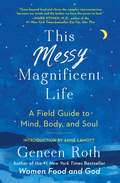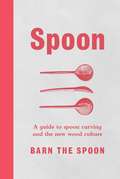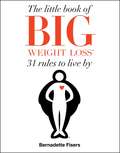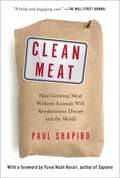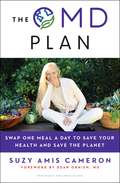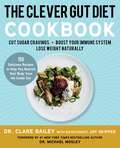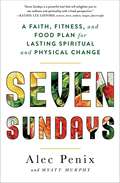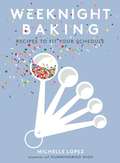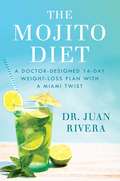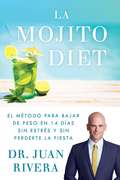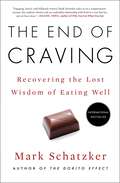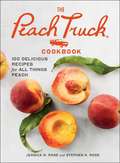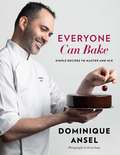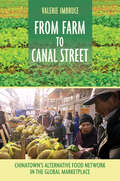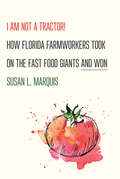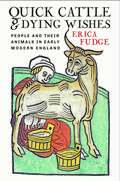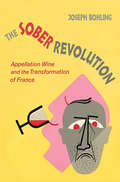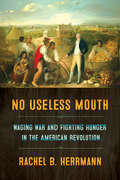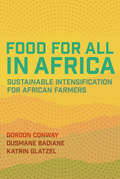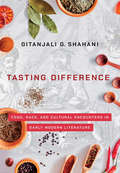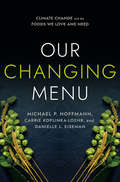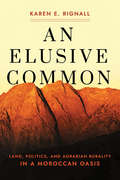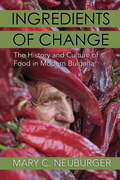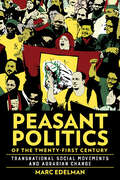- Table View
- List View
Baking All Year Round: Holidays & Special Occasions
by Rosanna PansinoRosanna Pansino, award-winning YouTube star, baker, entrepreneur, author, and proud dog mom returns with Baking All Year Round, the highly anticipated follow-up to her New York Times bestseller The Nerdy Nummies Cookbook.Baking All Year Round is filled with creative and delicious recipes for celebrating with friends and family throughout the year. There are eighty-six recipes covering holidays and special occasions such as Valentine’s Day, Mother’s Day, Father’s Day, Halloween, Christmas, birthdays, weddings, and more. Recipes include sweet treats like Blackberry Cobbler, Donut Cake, Confetti Pancakes, and BBQ Grill Brownie Cupcakes to savory dishes such as Heart Shaped Ravioli, Baseball Pizza, and cheesy garlic Breadstick Bones. Included in this book are several vegan, gluten free, or dairy free options. It’s the perfect cookbook for families to make fun food together and create lasting memories. Whether you’re celebrating at home or going to a party, Rosanna’s innovative ideas are sure to delight and entertain.
This Messy Magnificent Life: A Field Guide
by Anne Lamott Geneen RothInspiring, personal, and often spiritual reflections on how women can find peace, make wise choices, practice everyday joy, and step into their power from Geneen Roth—author of the #1 New York Times bestselling Women Food and God.From the beginning, Geneen Roth was told she was too sensitive, too emotional, too curious, too demanding, too intense, and too big. Yet gaining and losing weight for decades did not improve her self-worth or reduce other people’s criticisms. Like most women who struggle with their weight, she believed that if she could resolve what seemed to be the source of her self-hatred—how and what she ate—she would be thin, happy, and free. That belief, she discovered, was false. When her struggle with food ended—and didn’t change anything except the size of her thighs—she kept trying to fix other broken parts of herself with therapy, intensive meditation retreats, and rigorous spiritual practices. Yet it was only when Geneen stopped trying to change or fix herself—that she was at last able to feel at home in her mind, body, and life. Now, she shares the wisdom of giving up what Geneen calls "the Me Project," and finding the freedom, peace and power that await us just beyond it. With humor, compassion, and insight, This Messy Magnificent Life explores the personal beliefs, hidden traumas, and social pressures that shape not just women’s feelings about their bodies, but also their confidence, choices, and relationships. This provocative, enchanting, and sometimes laugh-out-loud look at the imperfect path women take to step into their own power, presence, and ownership is based on the author’s personal journey and her decades of work with thousands of women around the country. Roth embraces everyone’s unique and often unsung potential and shows us how to be open, curious, and kind with ourselves; how to say no to people and ideas that hold us back; how to let go of grudges and anxieties; how to pick ourselves up after setbacks; how to say a resounding yes to the world; how to move from fixing ourselves to finding ourselves; how to find joy in the ordinary; and how to experience the extraordinary right here and now in our bodies. With a foreword by Anne Lamott, This Messy Magnificent Life is a compelling and often quirky look at what it means to be an imperfect but unapologetic woman living a (mostly) magnificent life.
Spoon: A Guide to Spoon Carving and the New Wood Culture
by Barn The SpoonIn this fully illustrated and beautiful guide to our most functional utensil—the spoon—a master craftsman shares his life’s work: designing and carving exquisite, functional wooden spoons from branches and logs using time-honored woodworking skills and techniques.The simple, ordinary spoon is part of our everyday lives, from stirring our first cup of coffee to the long slurp of soup poured with a ladle to scraping the last bit of pudding from the bowl. Barn the Spoon is a master craftsman in the rarified art of spoon carving and a thoughtful proponent of the new wood culture renaissance. His love, care, and passion for wooden spoons is genuine and infectious. In Spoon he brings unparalleled color and character to his role as one of the world’s most respected spoon carvers and shares the extraordinary skill and gentle philosophy he applies to his life’s work. Barn shows how to use the axe and knife, from how they should feel in your hand to honing the perfect edge when carving your own spoons. Featuring sixteen unique designs in the four main categories of spoon—eating, serving, cooking, and measuring—Barn takes you through the nuances of their making, how each design is informed by its function at the table or in the kitchen, and the key skills you will learn. Stunning photography on nearly every page both inspires and acts as a blueprint to help perfect your technique. A celebration of the ordinary transformed into the extraordinary, Barn’s spoons take you on a journey into the new wood culture, from understanding the relationship among wood, the raw material, and its majestic origins in our trees and woodland, to the workshop and the axe block, and into your own kitchen. This gorgeous, full-color book is the perfect gift for the home chef, woodcarver, crafter, collector, artist, escapist urbanite, or anyone harboring dreams of a self-sufficient lifestyle.
The Little Book of Big Weight Loss
by Bernadette FisersFood Rules meets Skinny Bitch in this fun, accessible guide to radical and sustainable weight loss—based on a set of thirty-one food and lifestyle rules for everyone sick and tired of diet failure and confused by conflicting advice and complicated regimens.Successful hair and makeup artist Bernadette Fisers had struggled with her weight for years. She tried and failed many diets, but her life took a turn when she was forced to face a harsh reality: her weight crept up to 287 pounds and she had a BMI reading of forty-two. Pre-diabetic and diagnosed as morbidly obese with a fatty liver and high blood pressure, Bernadette decided that it was the time to ditch the fad diets and take matters into her own hands to turn her life around. She began asking those she knew well—the glamorous models she worked with—learning about their healthy eating habits and their tips on staying trim. She further researched medical reports and nutrition papers until finally—by trial, error, and a lot of experimentation—she created a healthy lifestyle plan that was quick to read, easy to understand, and, most importantly, worked long term. Following her new rules, Bernadette went on to lose more than sixty-six pounds in thirty weeks. The Little Book of Big Weight Loss is for anyone who has grown tired of all the confusing, conflicting advice and complicated diet plans. Inspiring and packed with invaluable tips and strategies, this guide provides a fresh, simple, can-do approach to dieting and can help you get on track to achieving your goals and losing weight long term.
Clean Meat: How Growing Meat Without Animals Will Revolutionize Dinner and the World
by Paul ShapiroPaul Shapiro gives you a front-row seat for the wild story of the race to create and commercialize cleaner, safer, sustainable meat—real meat—without the animals. From the entrepreneurial visionaries to the scientists&’ workshops to the big business boardrooms—Shapiro details that quest for clean meat and other animal products and examines the debate raging around it.Since the dawn of Homo sapiens some quarter million years ago, animals have satiated our species&’ desire for meat. But with a growing global population and demand for meat, eggs, dairy, leather, and more, raising such massive numbers of farm animals is woefully inefficient and takes an enormous toll on the planet, public health, and certainly the animals themselves. But what if we could have our meat and eat it, too? The next great scientific revolution is underway—discovering new ways to create enough food for the world&’s ever-growing, ever-hungry population. Enter clean meat—real, actual meat grown (or brewed!) from animal cells—as well as other clean foods that ditch animal cells altogether and are simply built from the molecule up. Also called lab-grown meat, cultured meat, or cell-based meat, this race promises promise to bring about another domestication. Whereas our ancestors domesticated wild animals into livestock, today we&’re beginning to domesticate their cells, leaving the animals out of the equation. From one single cell of a cow, you could feed an entire village. And the story of this coming &“second domestication&” is anything but tame.
OMD: The Simple, Plant-Based Program to Save Your Health, Save Your Waistline, and Save the Planet
by Dr Dean Ornish Suzy Amis CameronChange the World by Changing One Meal a Day Suzy Amis Cameron—environmental advocate, former actor, and mom of five—presents a clear-eyed and accessible guide for you to improve your health and shrink your personal carbon footprint simply by swapping one meat- and dairy-based meal for a plant-based one every day.The research is clear that a plant-based diet is the healthiest diet on Earth. But what many people don’t realize is that nothing else we do comes close to the environmental impact of what we eat. Now Suzy Amis Cameron explains how we can boost energy, feel better, live healthier, and heal the Earth, starting with just one meal a day. Developed at MUSE School, the school she founded with her sister Rebecca Amis, Suzy’s program makes it possible for anyone and everyone to reverse climate change while they embrace a healthier lifestyle. This one simple step will begin to help you lose weight and stay naturally thin, reverse chronic health concerns, improve overall wellbeing, enjoy newfound energy, and slash your carbon footprint in half. In OMD, Suzy shares her field-tested plan, outlining the latest science and research on why a plant-based diet is better for one’s health and the environment. Featuring fifty delicious, nourishing recipes and complete with inspiring success stories, shopping lists, meal plans, and pantry tips, OMD is an all-in-one resource for anyone who wants to take care of their body and our beautiful planet at the same time.
The Clever Gut Diet Cookbook: 150 Delicious Recipes to Help You Nourish Your Body from the Inside Out
by Joy Skipper Dr Michael Mosley Clare Bailey“Now readers can implement a diet plan and understand why it's going to work." —Dr. Barry Marshall, winner of the Nobel Prize for Medicine “Follow this advice for better gut health." —Dr Valter Longo, Director of the University of Southern California Longevity Institute The highly anticipated and essential cookbook companion to The Clever Gut Diet by the #1 New York Times bestselling author of the FastDiet series, featuring over 150 recipes to help you reap the benefits of a healthy gut, one delicious meal at a time.In The Clever Gut Diet, you learned the crucial role your gut plays in your overall wellbeing and in maintaining a healthy weight. Improving your gut health will help you control your cravings, boost your mood, ease intestinal distress, and lose weight. Now, in this eagerly awaited cookbook, you can take this groundbreaking program into your kitchen and enjoy the benefits of a gut-healthy diet at every meal. These delicious recipes for breakfasts, lunches, dinners, snacks, and mouthwatering desserts are proven to help revolutionize your body from the inside out, by increasing the “good” gut bacteria that keep you lean and healthy, while staving off the “bad” gut bacteria that contribute to weight gain and disease. Complete with shopping lists, meal plans, and helpful tips and tricks, this recipe collection will help you transform your gut and your health, one delectable bite at a time.
Seven Sundays: A Faith, Fitness, and Food Plan for Lasting Spiritual and Physical Change
by Myatt Murphy Alec PenixA Biblically grounded, six-week plan to lead you on the path toward losing weight and getting healthier by focusing on the connections between spiritual and physical health.So many of the books within the diet and fitness space focus on vanity or superficial reasons for striving for personal health and wellbeing. Is it any wonder then that a motivation that’s so surface-level has such a slim chance of working long-term? But Alec Penix believes that all things are possible if you use faith as your bedrock. In Seven Sundays, celebrity trainer and devoted follower of Christ Penix explains the connection between faith and fitness, and both his own and shares his clients’ success stories. When our spiritual and physical bodies are built up simultaneously, we find ourselves more likely to stick with healthier, life-changing habits, appreciate what we have, be thankful for what we've gained (and lost), and feel content with how far we’ve traveled. Seven Sundays is a six-week program that shows you how easy it is to undergo your own total transformation. The book is organized as a day-by-day journey in the same manner as a daily devotional. Over the course of each week, you will work on the “6 Pillars of Purpose” that build up this strength. You will also enjoy “Faith-Full” foods and explore a new spiritual theme each week. Ultimately, you’ll undertake a meaningful journey that will finally connect your body and spirit. After Seven Sundays, the changes required to live a healthier life become easier because you will want to do them—for God, for others, and for yourself—rather than ever feel as if you have to do them. It’s designed to inspire you to look inside yourself and recognize that it’s not that you need to exercise, eat right, and be healthy, but that you deserve to exercise, eat right, and be healthy, and recognize your body as a spiritual vessel.
Weeknight Baking: Recipes to Fit Your Schedule
by Michelle LopezMichelle Lopez—the wildly popular and critically acclaimed blogger behind Hummingbird High—teaches busy people how to make cookies, pies, cakes, and other treats, without spending hours in the kitchen.If anyone knows how to balance a baking obsession with a demanding schedule, it&’s Michelle Lopez. Over the past several years that she&’s been running her blog Hummingbird High, Lopez has kept a crucial aspect of her life hidden from her readers: she has a full-time, extremely demanding job in the tech world. But she&’s figured out how to have her cake and eat it too. In Weeknight Baking, Lopez shares recipes for drool-worthy confections, along with charming stories and time-saving tips and tricks. From everyday favorites like &“Almost No Mess Shortbread&” and &“Better-Than-Supernatural Fudge Brownies&” to showstoppers like &“a Modern Red Velvet Cake&” and &“Peanut Butter Pretzel Pie&” (it&’s vegan!), she reveals the secrets to baking on a schedule. With rigorously tested recipes, productivity hacks, and gorgeous photographs, this book is destined to become a busy baker&’s go-to. Finally, dessert can be a part of every everyday meal!
The Mojito Diet: A Doctor-Designed 14-Day Weight Loss Plan with a Miami Twist
by Dr Juan RiveraConceived by Dr. Juan Rivera, a board-certified internist and cardiologist in Miami who trained at Johns Hopkins Hospital and has helped countless patients lose weight, The Mojito Diet is a 14-day plan that will help you shed pounds, move more freely, and toast your way to permanently improving your health.Lose the weight, without skipping the party! Dr. Juan Rivera has heard it all before. “I don’t want to give up my comfort foods.” “I can’t handle the hunger pangs.” “You can’t ask me to give up my mojitos!” That’s why Dr. Juan, board certified internist and preventative cardiologist, designed The Mojito Diet, a foolproof plan developed to help you lose weight and improve your heart health, without the roadblocks that make you quit halfway. Based on the latest science, yet designed for real-world results, The Mojito Diet combines principles from the most effective diets—low-carb and intermittent fasting—into a unique and powerful 14-day plan that targets fat without causing carb cravings or hunger pangs. In two simple, straightforward steps, you’ll not only lose weight but also improve your heart health, and be able to reward yourself with a refreshing mojito at least twice a week! After reaching your goal weight, Dr. Juan eases you into his Mojito Maintenance Plan, designed to help you easily integrate healthy eating habits into your daily routine to keep the weight off con gusto. Complete with motivating tips, inspiring success stories, an easy-to-follow meal plan, and 75 delicious recipes bursting with Latin flavor, The Mojito Diet will transform your health, one sip at a time. ¡Salud!
La Mojito Diet: El método para bajar de peso en 14 días sin estrés y sin perderte la fiesta (Atria Espanol)
by Juan RiveraConcebida por el cardiólogo e internista Dr. Juan Rivera, quien entrenó en el Hospital de Johns Hopkins y ha ayudado a cientos de miles de individuos a bajar de peso, La Mojito Diet es un plan de 14 días que lo ayudará a perder libras, tener mayor movilidad y a obtener una mejor salud—todo mientras continúa disfrutando su vida. <P><P>Al Dr. Juan Rivera le han dado todas las excusas: “No puedo dejar mis antojitos y gustazos”. “No soporto las punzadas de hambre”. “¡Vivimos en Miami, por el amor de Dios! ¡No me pida que sacrifique a mis mojitos!” <P><P>Después de muchas de estas conversaciones, el Dr. Juan creó La Mojito Diet. Diseñado para ayudarte a ver resultados duraderos en tan solo 14 días, La Mojito Diet combina en dos pasos sencillos los mejores consejos disponibles sobre la pérdida de peso —reducir el consumo de carbohidratos e incorporar el ayuno intermitente— en este plan único y efectivo para quemar grasa y mejorar tu salud del corazón sin darte la ansiedad por comer carbohidratos o sentirte con hambre. <P><P>Incluyendo motivadores consejos, inspiradores testimonios de éxito, 75 deliciosas recetas con sabor latino y un plan de alimentación, La Mojito Diet te brinda las herramientas que necesitas para para poder transformar tu salud y fácilmente conservar tu peso ideal con gusto.
The End of Craving: Recovering the Lost Wisdom of Eating Well
by Mark SchatzkerAcclaimed journalist and author of The Dorito Effect delivers a groundbreaking, entertaining, and informative work that reveals how our dysfunctional relationship with food began—and how science is leading us back to healthier living and eating.For the last fifty years, we have been fighting a losing war on food. We have cut fat, reduced carbs, eliminated sugar, and attempted every conceivable diet only to find that eighty-eight million American adults are prediabetic, more than a hundred million have high blood pressure, and nearly half now qualify as obese. The harder we try to control what we eat, the more unhealthy we become. Why? Mark Schatzker has spent his career traveling the world in search of the answer. In The Dorito Effect, he revealed the startling relationship between flavor and nutrition. In Steak, he was one of the first authors to recognize the critical importance of regenerative agriculture. Now, in The End of Craving, he poses an even more profound question: What if the key to nutrition and good health lies not in resisting the primal urge to eat but in understanding its purpose? Beginning in the mountains of Europe and the fields of the Old South, Schatzker embarks on a quest to uncover the lost art of eating and living well. Along the way, he visits brain scanning laboratories and hog farms, and encounters cultural oddities and scientific paradoxes—northern Italians eat what may be the world&’s most delicious cuisine, yet are among the world&’s thinnest people; laborers in southern India possess an inborn wisdom to eat their way from sickness to good health. Schatzker reveals how decades of advancements in food technology have turned the brain&’s drive to eat against the body, placing us in an unrelenting state of craving. Only by restoring the relationship between nutrition and the essential joy of eating can we hope to lead longer and happier lives. Combining cutting-edge science and ancient wisdom, The End of Craving is an urgent and radical investigation that will fundamentally change how we understand both food and ourselves.
The Peach Truck Cookbook: 100 Delicious Recipes for All Things Peach
by Stephen K. Rose Jessica N. RoseTHE INSTANT NATIONAL BESTSELLER A warm and stylish Southern cookbook, from the owners of the beloved Nashville-based The Peach Truck, celebrating all things peach in 100 fresh and flavorful recipes.When Stephen and Jessica Rose settled in Nashville, they fell in love with their new city. Their only reservation: Where were the luscious peaches that Stephen remembered from his childhood in Georgia? Amid Nashville&’s burgeoning food scene, the couple partnered with his hometown peach orchard to bring just-off-the-tree Georgia peaches to their adopted city, selling them out of the back of their 1964 Jeep Gladiator in Nashville&’s farmer&’s markets. Since starting their company in 2012, Stephen and Jessica have attracted a quarter of a million followers on social media and have delivered more than 4.5 million peaches to tens of thousands of customers in 48 states. With The Peach Truck Cookbook, the couple brings the lusciousness of the Georgia peach and the savory and sweet charms of Southern cooking, as well as the story behind their success and an insider&’s guide to the Nashville food scene, to readers everywhere. From first bites to easy lunches to mouth-watering dinner dishes and sumptuous desserts, The Peach Truck Cookbook captures the Southern cooking renaissance with fresh, delectable, farm-to-table recipes that are easy to follow and feature peaches in every form. Whether you&’re craving peach pecan sticky buns, peach jalapeno cornbread, white pizza with peach, pancetta, and chile, or minty peach lemonade—or have always wanted to try your hand at making a classic peach pie—Stephen and Jessica have you covered. Many of Nashville&’s most celebrated hotspots and chefs, including Sean Brock, Lisa Donovan, and Tandy Wilson, have contributed recipes, so you&’ll also get a how-to on cult menu items such as Sean Brock&’s Double Cheeseburger with Peach Ketchup, Mas Tacos Peach Tamales, and Burger Up&’s Peach Truck Margarita. Also included are beautiful photographs illustrating each recipe and a pocket peach education—as Jessica and Stephen take you through peach varieties, best harvesting practices, and everything you need to know to have a peach-stocked pantry. Full of character and charm, The Peach Truck Cookbook is not only an essential addition to the peach-lover&’s kitchen, it will bring the beauty of summer to your table all year round.
Everyone Can Bake: Simple Recipes to Master and Mix
by Dominique AnselAcclaimed pastry chef Dominique Ansel shares his simple, foolproof recipes for tarts, cakes, jams, buttercreams, and more &“building blocks&” of desserts for home cooks to master and mix as they please. Dominique Ansel is the creator of beautiful, innovative, and delicious desserts, from the Frozen S&’More to the Cronut®, the croissant-doughnut hybrid that took the world by storm. He has been called the world&’s best pastry chef. But this wasn&’t always the case. Raised in a large, working-class family in rural France, Ansel could not afford college and instead began work as a baker&’s apprentice at age sixteen. There, he learned the basics—how to make tender chocolate cakes, silky custards, buttery shortbread, and more. Ansel shares these essential, go-to recipes for the first time. With easy-to-follow instructions and kitchen tips, home cooks can master the building-blocks of desserts. These crucial components can be mixed in a variety of ways, and Ansel will show you how: his vanilla tart shell can be rolled out and stamped into cookies; shaped and filled with lemon curd; or even crumbled into a topping for ice cream. This cookbook will inspire beginners and experienced home cooks alike to bake as imaginatively as Ansel himself.
From Farm to Canal Street: Chinatown's Alternative Food Network in the Global Marketplace
by Valerie ImbruceOn the sidewalks of Manhattan's Chinatown, you can find street vendors and greengrocers selling bright red litchis in the summer and mustard greens and bok choy no matter the season. The neighborhood supplies more than two hundred distinct varieties of fruits and vegetables that find their way onto the tables of immigrants and other New Yorkers from many walks of life. Chinatown may seem to be a unique ethnic enclave, but it is by no means isolated. It has been shaped by free trade and by American immigration policies that characterize global economic integration. In From Farm to Canal Street, Valerie Imbruce tells the story of how Chinatown's food network operates amid--and against the grain of--the global trend to consolidate food production and distribution. Manhattan's Chinatown demonstrates how a local market can influence agricultural practices, food distribution, and consumer decisions on a very broad scale. Imbruce recounts the development of Chinatown's food network to include farmers from multimillion-dollar farms near the Everglades Agricultural Area and tropical "homegardens" south of Miami in Florida and small farms in Honduras. Although hunger and nutrition are key drivers of food politics, so are jobs, culture, neighborhood quality, and the environment. Imbruce focuses on these four dimensions and proposes policy prescriptions for the decentralization of food distribution, the support of ethnic food clusters, the encouragement of crop diversity in agriculture, and the cultivation of equity and diversity among agents in food supply chains. Imbruce features farmers and brokers whose life histories illuminate the desires and practices of people working in a niche of the global marketplace.
I Am Not a Tractor!: How Florida Farmworkers Took On the Fast Food Giants and Won
by Susan L. MarquisI Am Not a Tractor! celebrates the courage, vision, and creativity of the farmworkers and community leaders who have transformed one of the worst agricultural situations in the United States into one of the best. Susan L. Marquis highlights past abuses workers suffered in Florida’s tomato fields: toxic pesticide exposure, beatings, sexual assault, rampant wage theft, and even, astonishingly, modern-day slavery. Marquis unveils how, even without new legislation, regulation, or government participation, these farmworkers have dramatically improved their work conditions.Marquis credits this success to the immigrants from Mexico, Haiti, and Guatemala who formed the Coalition of Immokalee Workers, a neuroscience major who takes great pride in the watermelon crew he runs, a leading farmer/grower who was once homeless, and a retired New York State judge who volunteered to stuff envelopes and ended up building a groundbreaking institution. Through the Fair Food Program that they have developed, fought for, and implemented, these people have changed the lives of more than thirty thousand field workers. I Am Not a Tractor! offers a range of solutions to a problem that is rooted in our nation’s slave history and that is worsened by ongoing conflict over immigration.
Quick Cattle and Dying Wishes: People and Their Animals in Early Modern England
by Erica FudgeWhat was the life of a cow in early modern England like? What would it be like to milk that same cow, day-in, day-out, for over a decade? How did people feel about and toward the animals that they worked with, tended, and often killed? With these questions, Erica Fudge begins her investigation into a lost aspect of early modern life: the importance of the day-to-day relationships between humans and the animals with whom they worked. Such animals are and always have been, Fudge reminds us, more than simply stock; they are sentient beings with whom one must negotiate. It is the nature, meaning, and value of these negotiations that this study attempts to recover.By focusing on interactions between people and their livestock, Quick Cattle and Dying Wishes restores animals to the central place they once had in the domestic worlds of early modern England. In addition, the book uses human relationships with animals—as revealed through agricultural manuals, literary sources, and a unique dataset of over four thousand wills—to rethink what quick cattle meant to a predominantly rural population and how relationships with them changed as more and more people moved to the city. Offering a fuller understanding of both human and animal life in this period, Fudge innovatively expands the scope of early modern studies and how we think about the role that animals played in past cultures more broadly.
The Sober Revolution: Appellation Wine and the Transformation of France
by Joseph BohlingBurgundy, Bordeaux, Champagne. The names of these and other French regions bring to mind time-honored winemaking practices. Yet the link between wine and place, in French known as terroir, was not a given. In The Sober Revolution, Joseph Bohling inverts our understanding of French wine history by revealing a modern connection between wine and place, one with profound ties to such diverse and sometimes unlikely issues as alcoholism, drunk driving, regional tourism, Algeria’s independence from French rule, and integration into the European Economic Community.In the 1930s, cheap, mass-produced wines from the Languedoc region of southern France and French Algeria dominated French markets. Artisanal wine producers, worried about the impact of these "inferior" products on the reputation of their wines, created a system of regional appellation labeling to reform the industry in their favor by linking quality to the place of origin. At the same time, the loss of Algeria, once the world’s largest wine exporter, forced the industry to rethink wine production. Over several decades, appellation producers were joined by technocrats, public health activists, tourism boosters, and other dynamic economic actors who blamed cheap industrial wine for hindering efforts to modernize France. Today, scholars, food activists, and wine enthusiasts see the appellation system as a counterweight to globalization and industrial food. But, as The Sober Revolution reveals, French efforts to localize wine and integrate into global markets were not antagonistic but instead mutually dependent. The time-honored winemaking practices that we associate with a pastoral vision of traditional France were in fact a strategy deployed by the wine industry to meet the challenges and opportunities of the post-1945 international economy. France’s luxury wine producers were more market savvy than we realize.
No Useless Mouth: Waging War and Fighting Hunger in the American Revolution
by Rachel B. HerrmannIn the era of the American Revolution, the rituals of diplomacy between the British, Patriots, and Native Americans featured gifts of food, ceremonial feasts, and a shared experience of hunger. When diplomacy failed, Native Americans could destroy food stores and cut off supply chains in order to assert authority. Black colonists also stole and destroyed food to ward off hunger and carve out tenuous spaces of freedom. Hunger was a means of power and a weapon of war.In No Useless Mouth, Rachel B. Herrmann argues that Native Americans and formerly enslaved black colonists ultimately lost the battle against hunger and the larger struggle for power because white British and United States officials curtailed the abilities of men and women to fight hunger on their own terms. By describing three interrelated behaviors—food diplomacy, victual imperialism, and victual warfare—the book shows that, during this tumultuous period, hunger prevention efforts offered strategies to claim power, maintain communities, and keep rival societies at bay.Herrmann shows how Native Americans, free blacks, and enslaved peoples were "useful mouths"—not mere supplicants for food, without rights or power—who used hunger for cooperation and violence, and took steps to circumvent starvation. Her wide-ranging research on black Loyalists, Iroquois, Cherokee, Creek, and Western Confederacy Indians demonstrates that hunger creation and prevention were tools of diplomacy and warfare available to all people involved in the American Revolution. Placing hunger at the center of these struggles foregrounds the contingency and plurality of power in the British Atlantic during the Revolutionary Era.Thanks to generous funding from Cardiff University, the ebook editions of this book are available as Open Access volumes from Cornell Open (cornellopen.org) and other repositories.
Food for All in Africa: Sustainable Intensification for African Farmers
by Ousmane Badiane Gordon Conway Katrin GlatzelAfrica requires a new agricultural transformation that is appropriate for Africa, that recognizes the continent's diverse environments and climates, and that takes into account its histories and cultures while benefiting rural smallholder farmers and their families.In this boldly optimistic book, Sir Gordon Conway, Ousmane Badiane, and Katrin Glatzel describe the key challenges faced by Africa's smallholder farmers and present the concepts and practices of Sustainable Intensification (SI) as opportunities to sustainably transform Africa's agriculture sector and the livelihoods of millions of smallholders. The way forward, they write, will be an agriculture sector deeply rooted within SI: producing more with less, using fertilizers and pesticides more prudently, adapting to climate change, improving natural capital, adopting new technologies, and building resilience at every stage of the agriculture value chain.Food for All in Africa envisions a virtuous circle generated through agricultural development rooted in SI that results in greater yields, healthier diets, improved livelihoods for farmers, and sustainable economic opportunities for the rural poor that in turn generate further investment. It describes the benefits of digital technologies for farmers and the challenges of transforming African agricultural policies and creating effective and inspiring leadership.Food for All in Africa demonstrates why we should take on the challenge and provides ideas and methods through which it can be met.
Tasting Difference: Food, Race, and Cultural Encounters in Early Modern Literature
by Gitanjali G. ShahaniTasting Difference examines early modern discourses of racial, cultural, and religious difference that emerged in the wake of contact with foreign peoples and foreign foods from across the globe. Gitanjali Shahani reimagines the contact zone between Western Europe and the global South in culinary terms, emphasizing the gut rather than the gaze in colonial encounters.From household manuals that instructed English housewives how to use newly imported foodstuffs to "the spicèd Indian air" of A Midsummer Night's Dream, from the repurposing of Othello as an early modern pitchman for coffee in ballads to the performance of disgust in travel narratives, Shahani shows how early modern genres negotiated the allure and danger of foreign tastes.Turning maxims such as "We are what we eat" on their head, Shahani asks how did we (the colonized subjects) become what you (the colonizing subjects) eat? How did we become alternately the object of fear and appetite, loathing and craving? Shahani takes us back several centuries to the process by which food came to be inscribed with racial character and the racial other came to be marked as edible, showing how the racializing of food began in an era well before chicken tikka masala and Balti cuisine. Bringing into conversation critical paradigms in early modern studies, food studies, and postcolonial studies, she argues that it is in the writing on food and eating that we see among the earliest configurations of racial difference, and it is experienced both as a different taste and as a taste of difference.
Our Changing Menu: Climate Change and the Foods We Love and Need
by Michael P. Hoffmann Carrie Koplinka-Loehr Danielle L. EisemanOur Changing Menu unpacks the increasingly complex relationships between food and climate change. Whether you're a chef, baker, distiller, restaurateur, or someone who simply enjoys a good pizza or drink, it's time to come to terms with how climate change is affecting our diverse and interwoven food system. Michael P. Hoffmann, Carrie Koplinka-Loehr, and Danielle L. Eiseman offer an eye-opening journey through a complete menu of before-dinner drinks and salads; main courses and sides; and coffee and dessert. Along the way they examine the escalating changes occurring to the flavors of spices and teas, the yields of wheat, the vitamins in rice, and the price of vanilla. Their story is rounded out with a primer on the global food system, the causes and impacts of climate change, and what we can all do. Our Changing Menu is a celebration of food and a call to action—encouraging readers to join with others from the common ground of food to help tackle the greatest challenge of our time.
An Elusive Common: Land, Politics, and Agrarian Rurality in a Moroccan Oasis (Cornell Series on Land: New Perspectives on Territory, Development, and Environment)
by Karen E. RignallAn Elusive Common details the fraught dynamics of rural life in the arid periphery of southeastern Morocco. Karen Rignall considers whether agrarian livelihoods can survive in the context of globalized capitalism and proposes a new way of thinking about agrarian practice, politics, and land in North Africa and the Middle East. Her book questions many of the assumptions underlying movements for land and food sovereignty, theories of the commons, and environmental governance. Global market forces, government disinvestment, political marginalization, and climate change are putting unprecedented pressures on contemporary rural life. At the same time, rural peoples are defying their exclusion by forging new economic and political possibilities. In southern Morocco, the vibrancy of rural life was sustained by creative and often contested efforts to sustain communal governance, especially of land, as a basis for agrarian livelihoods and a changing wage labor economy. An Elusive Common follows these diverse strategies ethnographically to show how land became a site for conflicts over community, political authority, and social hierarchy. Rignall makes the provocative argument that land enclosures can be an essential part of communal governance and the fight for autonomy against intrusive state power and historical inequalities.
Ingredients of Change: The History and Culture of Food in Modern Bulgaria
by Mary C. NeuburgerIngredients of Change explores modern Bulgaria's foodways from the Ottoman era to the present, outlining how Bulgarians domesticated and adapted diverse local, regional, and global foods and techniques, and how the nation's culinary topography has been continually reshaped by the imperial legacies of the Ottomans, Habsburgs, Russians, and Soviets, as well as by the ingenuity of its own people. Changes in Bulgarian cooking and cuisine, Mary C. Neuburger shows, were driven less by nationalism than by the circulation of powerful food narratives—scientific, religious, and ethical—along with peoples, goods, technologies, and politics. Ingredients of Change tells this complex story through thematic chapters focused on bread, meat, milk and yogurt, wine, and the foundational vegetables of Bulgarian cuisine—tomatoes and peppers. Neuburger traces the ways in which these ingredients were introduced and transformed in the Bulgarian diet over time, often in the context of Bulgaria's tumultuous political history. She shows how the country's modern dietary and culinary transformations accelerated under a communist dictatorship that had the resources and will to fundamentally reshape what and how people ate and drank.
Peasant Politics of the Twenty-First Century: Transnational Social Movements and Agrarian Change (Cornell Series on Land: New Perspectives on Territory, Development, and Environment)
by Marc EdelmanPeasant Politics of the Twenty-First Century illuminates the transnational agrarian movements that are remaking rural society and the world's food and agriculture systems. Marc Edelman explains how peasant movements are staking their claims from farmers' fields to massive protests around the world, shaping heated debates over peasants' rights and the very category of "peasant" within the agrarian organizations and in the United Nations.Edelman chronicles the rise of these movements, their objectives, and their alliances with environmental, human rights, women's, and food justice groups. The book scrutinizes high-profile activists and the forgotten genealogies and policy implications of foundational analytical frameworks like "moral economy," and concepts, such as "food sovereignty" and "civil society." Peasant Politics of the Twenty-First Century charts the struggle of agrarian movements in the face of land grabbing, counter agrarian reform, and a looming climate catastrophe, and celebrates engaged research from Central America to the UN Human Rights Council in Geneva.

